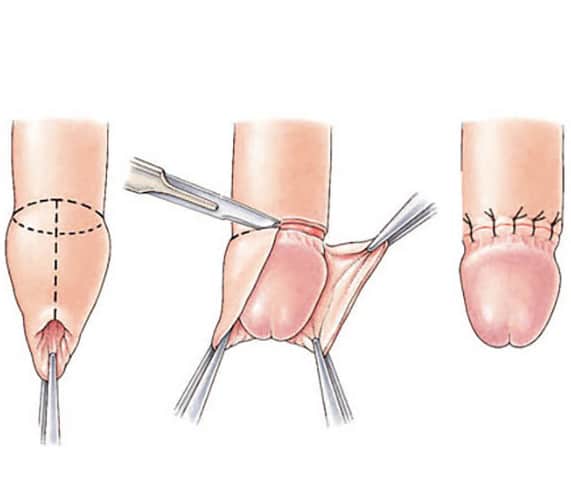Circumcision Tunisia
What is circumcision ?
 Circumcision is a surgical procedure that involves partially or completely removing the foreskin, the skin that covers the glans penis in men or the clitoral hood in women. In some communities around the world, this practice is done for cultural, religious, or medical reasons. Male circumcision is more common than female circumcision and is sometimes recommended for health reasons, such as reducing infections or other complications.
Circumcision is a surgical procedure that involves partially or completely removing the foreskin, the skin that covers the glans penis in men or the clitoral hood in women. In some communities around the world, this practice is done for cultural, religious, or medical reasons. Male circumcision is more common than female circumcision and is sometimes recommended for health reasons, such as reducing infections or other complications.
At what age can children be circumcised ?
Children are usually circumcised at a fairly young age, often within the first few months. However, there are no strict rules on the age at which a person should be circumcised. Shortly after birth, some families do this, while others prefer to wait until the child is a little older.
Is adult circumcision a common procedure ?
Although circumcision is less common among adults than among newborns, it is performed in certain medical or cultural contexts. Adults are often circumcised for medical reasons, such as phimosis or infection prevention, or for personal or religious reasons. Circumcision in adults is a procedure practiced in some societies and contexts, although less common than in newborns.
What is the difference between circumcision in adults and children ?
Circumcision in children and adults differs significantly. Due to the full development of the foreskin in adults, the procedure is usually more involved, which may result in a longer recovery period. The procedure may also cause more pain and discomfort for adults. However, circumcision is frequently performed on children in the first weeks of life, which promotes faster healing and reduced pain. Additionally, infants generally have a lower risk of complications than adults.
Is it painful ?
The pain caused by circumcision can vary from person to person. Circumcision is usually performed under local or general anesthesia to reduce pain during the procedure. It is possible to experience some discomfort, tenderness, or pain while healing after the procedure. However, to relieve the pain and discomfort felt after a circumcision, doctors usually prescribe painkillers.
How does the surgery take place ?
The foreskin of the penis is removed by a surgical procedure called circumcision, which is usually performed on infants, children or adults. Circumcision begins with disinfection of the genital area, followed by local or general anesthesia, depending on the patient's age and medical preferences. The surgeon then performs the excision of the foreskin using specific techniques. Postoperative care is necessary after the procedure to ensure optimal healing and avoid infections. To ensure a safe recovery, it is essential to follow medical recommendations and carefully monitor the operated area.
What postoperative care is needed ?
It is advisable to gently clean the operated area with lukewarm water and mild soap to keep it clean and dry. To avoid irritation, it is important to avoid rubbing or pressure on the area and wear loose-fitting clothing. During the recovery period, it is recommended to avoid strenuous physical activities and use sterile compresses to protect the wound. It is possible to take painkillers prescribed by your doctor if you are in pain. It is essential to follow all doctor's recommendations and consult the healthcare professional if there are signs of infection or complications.
How long does recovery take ?
The age of the patient and the type of circumcision performed determine the recovery time after a circumcision. Complete recovery in children may take about one to two weeks. To avoid any complications and ensure rapid recovery, it is essential to follow medical instructions during this period. Adults may need more time to recover, usually two to three weeks.
What are the advantages ?
Circumcision has many health benefits. Firstly, it significantly reduces the risk of sexually transmitted infections like HIV and other sexually transmitted diseases. Additionally, circumcision may reduce the risk of developing penile cancer. Additionally, this procedure can improve genital hygiene, making daily maintenance easier and reducing the risk of infections.
What are the risks ?
Circumcision, whether performed by children or adults, presents risks that must be taken into account. Excessive bleeding, infections in the operated area, damage to the glans or foreskin and sometimes poor healing are some of the potential complications in children. The risks for adults are the same as for children, but they may also include chronic pain, decreased sexual pleasure, or allergic reactions to medications used during the procedure.